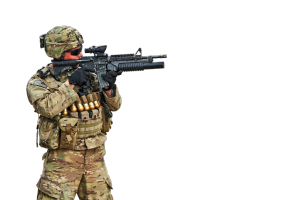 You likely know there is massive litigation emerging around 3M Company’s Combat Arms, dual-sided earplugs. These 3M Earplugs were sold to the U.S. government and distributed to members of the military in a huge contract over a period of 12 or 13 years. And many lawsuits have been filed recently that allege that these 3M Earplugs were defective, and they left thousands and thousands of soldiers with permanent hearing loss or tinnitus. It’s called noise-induced hearing damage. So my friend Chet Sechrest will talk about the unique ways that soldiers are exposed to loud noises. And it’s not always what you think; it’s not simply shooting a rifle or getting trained and the use of weapons or rifles, but also it could be serving as a mechanic for heavy engines, or being exposed to loud tanks or other industrial equipment. And as Chet points out, it could also simply be taking rides on very loud helicopters over and over again without the proper hearing protection. But that’s enough of an introduction. Let’s get to my Q&A with Chet Sechrest.
You likely know there is massive litigation emerging around 3M Company’s Combat Arms, dual-sided earplugs. These 3M Earplugs were sold to the U.S. government and distributed to members of the military in a huge contract over a period of 12 or 13 years. And many lawsuits have been filed recently that allege that these 3M Earplugs were defective, and they left thousands and thousands of soldiers with permanent hearing loss or tinnitus. It’s called noise-induced hearing damage. So my friend Chet Sechrest will talk about the unique ways that soldiers are exposed to loud noises. And it’s not always what you think; it’s not simply shooting a rifle or getting trained and the use of weapons or rifles, but also it could be serving as a mechanic for heavy engines, or being exposed to loud tanks or other industrial equipment. And as Chet points out, it could also simply be taking rides on very loud helicopters over and over again without the proper hearing protection. But that’s enough of an introduction. Let’s get to my Q&A with Chet Sechrest.
Clay: Chet was an Army Ranger and a member of Special Forces. He pulled three tours of duty in Iraq. So Chet, how long did you serve in the military?
Chet: I served a total of 27 years and nine months in the military.
Clay: So almost 28 years. When did you first enlist?
Chet: I started November 1st in ’83 came in the army as an 11 Bravo, an infantry guy, and I was assigned to the first Ranger battalion and I’m kind of thankful because it provided a base of knowledge that has benefited me throughout my career.
Clay: What was your first job back in the military first thing in 1983-84?
 Chet: My first job was I was just a rifleman, in our Ranger company, Bravo Company, first 75th Ranger battalion. And our job was to train to defeat the enemy, accomplish the mission, whatever was assigned to us. Being in the Ranger battalion was a lot different than being in a regular infantry battalion. Because at the time, there were only two Ranger battalions. Currently, there’s a regiment, there are three Ranger battalions. But being there, we had so much more opportunity to actually really train. So we actually did a lot of had a lot of training opportunities, fired a lot of rounds to help me become the best soldier I can be. And I appreciate that.
Chet: My first job was I was just a rifleman, in our Ranger company, Bravo Company, first 75th Ranger battalion. And our job was to train to defeat the enemy, accomplish the mission, whatever was assigned to us. Being in the Ranger battalion was a lot different than being in a regular infantry battalion. Because at the time, there were only two Ranger battalions. Currently, there’s a regiment, there are three Ranger battalions. But being there, we had so much more opportunity to actually really train. So we actually did a lot of had a lot of training opportunities, fired a lot of rounds to help me become the best soldier I can be. And I appreciate that.
Clay: So you had a ton of experience through that period, shooting rifles and shooting weapons?
Chet: Oh, absolutely. And then figure out the rest of my career and Special Forces.
Clay: When did you start training to be an Army Ranger?
Chet: I was assigned to the first Ranger battalion after I finished my AIT. So that was our early ’84. And I went to the rep range or indoctrination program. It’s changed since then, even after I completed that I went to my Ranger company and I was in Bravo Company, third platoon. And I stayed there for almost a year. Then they sent me to Ranger School. And I came back and stayed there for a little while and moved on to other things in the military.
Clay: Tell me about the Army Rangers.
Chet: It’s an all-volunteer organization. Everybody that is assigned there wants to be there. So not only did they volunteer to join the army, volunteered to be infantry combat arms, volunteer to go to airborne school. But they also volunteered to try out for the Ranger Regiment, and go through the selection process, and be selected. So it was a pleasure to work with everybody else that wanted to be there as much as I wanted to be there. Unlike regular army units where, “Okay, we appreciate your volunteering for the army, hey, that’s great. We’re gonna send you over here with a lot of other people that really don’t want to be here either.” So, but what’s different about the Rangers is the mutual motivation that you received from your brothers and sisters, as part of the regiment to complete the mission, and just improve yourself as a soldier.
Clay: It matters a lot when you’re surrounded by like-minded people.
Chet: It makes a night and day difference, especially if you work with some other units where the thought process is . . . I’ll say is not the same. But the motivation is not the same. You can see it. It really helps you as an individual excel more when you know the person to your left or right is doing the same thing with you, encouraging you, motivating you. You’re part of the team that lasts forever because even though I’m retired now, a lot of my friends I’ve known from the early ’80s. We still talk; we still get together. You know, you have a brotherhood for life.
Clay: Oh, man, that’s great. So you were also a member of the Special Forces?
Chet: Oh, yeah, I wanted to further my career, look at doing some other things. And in ’86, I was up for re-enlistment and I tried out for the 18 Delta Special Forces medical Sergeant program, went through the program I graduated, I was assigned first to 10th Special Forces Group, but before Fort Devens now they’re at Fort Carson. And I was at Fort Devens for about five years. And then I went to I was in third better. And then I went to the first battalion and Panzer in Germany for a couple years. And then did a road instructor tour at Fort Bragg, the Special Warfare Center in school. And then from there, I went to third group, a second battalion, spent a tour there got to go a lot of places I hadn’t been before, and then went from there to civil affairs when it was a special forces assignment only. After that, they were standing up a new unit of operational advisors, asymmetric warfare group. By command, SAR major suggests that it would be a good opportunity for me. So I tried out and got selected and worked in as an operational advisor for the asymmetric warfare group. And then came back to civil affairs when they were forming a new MLS. They were pushing all the Special Forces, serious guys, out, and they asked if I would come back and help build the MLS and had a lot of job satisfaction. So affairs when I was there in Special Forces. So I agreed and I came back to Fort Bragg and retired out of the civil affairs in 2011.
Clay: You’ve covered a lot of ground. So you told me that you’ve had three tours in Iraq?
Chet: Yeah, I mean, I deployed any time my country asked me to deploy. So they were all different durations, primarily where I’ve been to Baghdad, some other places. That was, you see a lot that you look back on and can learn in many different ways. It’s interesting when you look back to collect the lessons learned how much you can learn, if you pay attention to a lot of things that we usually don’t like, our discussion here on hearing this a major issue and it’s something that is pounded on you from basic training all the way through the end of your career is hearing protection. And even deployed, they want to make sure you’ve got hearing protection. And when you look back on some of this stuff, I guess you can see sometimes where the ball was dropped in different places, and proper products, things like that.
Clay: You were telling me that you collected hostile fire pay. How do you qualify for hostile fire pay?
Chet: Well, a lot of service members serve in countries that, you know, we’re providing training or aid to where the climate is considered hostile, whether it’s a criminal threat or a threat from potential combat operations, and another area bleeding over into where you’re at. There’s just any place where, you know, you take your weapons, you’ve got ammunition, you’re prepared to defend yourself. But they labeled it as hostile fire pay, not necessarily combat day.
Clay: So let’s talk about your work as a medic. Obviously, you’ve treated injured soldiers. Tell me about that. Talk to me about your exposure to injured soldiers either on the battlefield or in some other area?
Chet: Sure, I run the gamut from A to Z. And I’m thankful that I was trained as a special forces medic, which is a higher level of training, helps me better treat my patients having that level of training. And believe it or not, I still keep my paramedic credentials current. I just restarted them again in March. But yeah, I’ve seen trauma through illness, infants through old people and the full range in many different environments, from combat environments, refugee environments, humanitarian disaster and environments and just other things where we’ve had to provide aid and treatment to not just our service members, but allied service members and the local population.
Clay: You mentioned that in the Army that you were drilled and trained and reminded about the need for hearing protection, did you yourself train other soldiers in proper hearing protection?
Chet: It was one of my duties first as the team medic, and then I was also a battalion medic twice. And, yeah, we do a risk management, risk assessments matrix before we do any training and earplugs are right on there, you don’t go out to a shooting range or demolition range without hearing protection. You can’t even go up with a line and shoot unless you have the hearing protection. So it’s a requirement, you know, for me as the medic, because I’m the medical person responsible on-site to ensure everybody has the proper hearing protection in. So at different times, some people have the pelters some people have other sod-type hearing devices. Other times, it’s the different plugs that you would put in your ears. And depending on what we got, like the 3M products, we would read the instructions and use them accordingly. And assume based on proper application of the instructions, the hearing protection would provide the protection required when conducting the training did not result in any hearing loss.
Clay: So I think it’s pretty obvious that you have seen soldiers whose hearing was damaged from a firefight or a battlefield or some other trauma?
Chet: Oh, it’s a little of everything, because we just don’t shoot our guns in combat operations, but even more in training operations. So a lot of times, even in the training environment, you know, when you’re actively involved in shooting or collecting demolition operations, or even flying in helicopters because some of the helicopters get really, really loud for flying for a long flight and you don’t have your protection and you’re going to feel like you walked out of a concert hall when you step out of the helicopter. But I definitely have seen guys come off the line, you know, complaining, you know, their ears hurt because the plugs came out or weren’t placed properly after shooting a couple of rounds. And it’s definitely happened more than once.
Clay: That’s interesting. Of course, helicopters are no doubt extremely loud environments, or can you think of some other loud environments and you’ve mentioned several, so you may not but can you think of some other loud environments where it just was loud, not just rifle shots, but we often don’t think of helicopters even though that’s an incredibly loud machine.
Chet: You look at all the service members that work on the flight line. So they’re exposed to helicopters, aircraft jet noises. You look at people that work on heavy machinery and enclosed places, that the noise is just really loud that they’re supposed to be wearing earplugs or earmuffs to protect their hearing. It’s a requirement that so many different places beyond shooting bullets and blowing things up that can damage your hearing, like truck drivers. All your engine mechanic says we have huge diesel generators that guys go out and repair. So you’re looking at mechanics, it’s something we take for granted. But mechanics are also exposed to loud noise at decibels above 85, which could cause some type of hearing damage. So there are so many different areas within the military system, Air Force, Army, Navy, Marine, where servicemembers can be impacted by adverse sounds.
Clay: Great points. And you’ve already touched on the training exercises. But obviously, that might be where you’re exposed as a soldier to the loudest noises because the training takes place a lot more than your exposure to combat?
Chet: Yes, that’s correct. Some units that train more are exposed to a lot more. A lot of special operation units have higher budgets and shoot a lot more rounds or conduct demolitions and other training to a higher frequency. So their exposure rates are going to be a lot higher than other service members that might say only be required to qualify once a year, which means they get like nine rounds to zero their weapon, and then they get 40 rounds to try to qualify, then that’s all they shoot for the year. So it varies.
In Part 2 we’ll go deeper into the ways soldiers and service members are often exposed to dangerously high noise levels, and how Chet used 3M Earplugs and later developed hearing loss.
Note: This conversation was lightly edited and condensed for clarity.
 North Carolina Product Liability Lawyer Blog
North Carolina Product Liability Lawyer Blog


